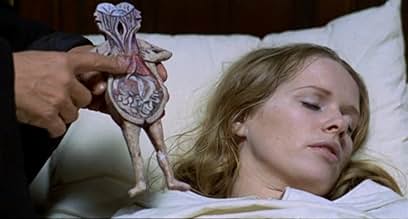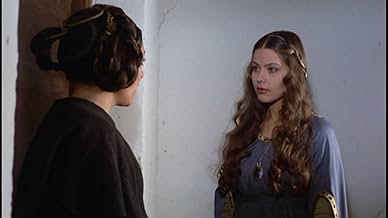A female vampire rises from her crypt every night in search of children as her victims.A female vampire rises from her crypt every night in search of children as her victims.A female vampire rises from her crypt every night in search of children as her victims.
José María Prada
- L'homme Mystérieux
- (as José Mª Prada)
José María Caffarel
- Le Médecin
- (as José Mª Caffarel)
Featured reviews
Don't expect 70s Eurohorror in the vein of Jess Franco and the like, and don't expect anything ingenious like the efforts of the director's father. It's a loose adaptation of motives by early romanticist Ludwig Tieck, and since there was no vampirism in literature back then, THERE ARE NO VAMPIRES IN THIS MOVIE EITHER! Just Liv Ullman coming back from the dead after 10 years and strangling children. Great locations, good acting, but neither a convincing drama nor a satisfying horror film. But I've seen much worse than that and young Ornella Muti's a treat. And I like the fact that some screenwriters of the seventies got back to classic seldom filmed literature (like Ado Kyrou did in the far superior 'Le Moine') instead of copying plotlines, themes and motives that have been used a thousand times before.
Michel Piccoli plays Richard, a nobleman whose wife Leonor (Liv Ullmann) dies fairly young. Some years later (although the film doesn't make this clear), he impulsively marries a much younger woman, Catherine (the luscious Ornella Muti). But he simply cannot get over the memory of Leonor, entering into a forbidding bargain with a charismatic stranger whom he meets near a bridge. The ramifications of the resurrected Leonor are chilling, as the local children start perishing. And all of this while The Plague is decimating the populace.
The fact that director Juan Bunuel is the son of the legendary Luis Bunuel will ensure that curiosity is raised among many interested viewers. The result here is one of those slow, stately foreign films that straddles the line between art house cinema and (not so traditional) horror stories. It has plenty of atmosphere and a very melancholy feel, so it's not something that one can just easily dismiss. Its wonderful international cast is very easy to watch, especially the enchanting Ms. Muti, whom many people will likely know best for the 1980 "Flash Gordon" feature film. Antonio Ferrandis is also excellent as the despairing Father Thomas.
"Leonor" is provocatively designed (by Enrique Alarcon), photographed (by Luciano Tovoli), and scored (by the great Ennio Morricone). It makes for rather potent entertainment, but people should be aware that the cheesy poster art does not really indicate the nature of the story. This is something far more serious and portentous. The bottom line is that if one admires the European art / horror films of the 1970s, they will find much to enjoy here. Leonard Maltin may have saddled it with his bottom-of-the-barrel "BOMB" rating, but in no way does it deserve that level of scorn.
Eight out of 10.
The fact that director Juan Bunuel is the son of the legendary Luis Bunuel will ensure that curiosity is raised among many interested viewers. The result here is one of those slow, stately foreign films that straddles the line between art house cinema and (not so traditional) horror stories. It has plenty of atmosphere and a very melancholy feel, so it's not something that one can just easily dismiss. Its wonderful international cast is very easy to watch, especially the enchanting Ms. Muti, whom many people will likely know best for the 1980 "Flash Gordon" feature film. Antonio Ferrandis is also excellent as the despairing Father Thomas.
"Leonor" is provocatively designed (by Enrique Alarcon), photographed (by Luciano Tovoli), and scored (by the great Ennio Morricone). It makes for rather potent entertainment, but people should be aware that the cheesy poster art does not really indicate the nature of the story. This is something far more serious and portentous. The bottom line is that if one admires the European art / horror films of the 1970s, they will find much to enjoy here. Leonard Maltin may have saddled it with his bottom-of-the-barrel "BOMB" rating, but in no way does it deserve that level of scorn.
Eight out of 10.
This is probably one of the most underrated, if not, THE most underrated horror film of all time. It has a 4.8 rating on IMDb, yet it deserves at least a 7.8. Never released in theaters in the US, the film eventually showed up on VHS, marketed as a cash-in on The Exorcist, under the title "Mistress of the Devil", and it was a huge disappointment, mainly because the two films have absolutely nothing in common. The story here, which recalls the works of Poe, follows a man who makes a pact with the Devil to have his dead wife, played by Liv Ullmann, back from the grave. She does come back, but as vampire who preys on young children. Stylishly directed by Luis Bunuel's son - Juan Bunuel, the film is a slow-burn, but never really boring, and it is actually pretty scary at times, while being romantic and touching as well, including some of the most heartbreaking scenes in horror cinema. The beautiful cinematography, courtesy of Suspiria's Luciano Tovoli, and the gorgeous locations at the Spanish countryside, add to the film's brooding Gothic atmosphere. Ullman gives an amazing performance as usual, and is one of the most gorgeous vampires out there IMO. Ennio Morricone's fantastic score perfectly captures the gloominess and foreboding atmosphere of this tragic love story. Overall, 10/10 for me.
When his beloved wife Leonor (Liv Ullmann) is crushed by her horse, medieval nobleman Richard (Michel Piccoli) rushes to be by her side, the woman dying shortly thereafter. Richard attempts to assuage his grief by 'getting back in the saddle', so to speak, immediately marrying local beauty Catherine (the stunning Ornella Muti, of Flash Gordon fame) - and by 'immediately', I mean the very same day that Leonor carks it. That should take his mind off things!
Of course, some guys are never happy...
Catherine bears Richard two sons, Matthew and Gregory, but even after ten years, the wealthy lord still longs for the companionship of his first wife. So when a mysterious stranger tells Richard that he can reunite him with his long dead Leonor, he jumps at the chance. Sure enough, Leonor is resurrected, leaving Richard to make Catherine disappear - by stabbing her in the guts and chucking her down a well (divorce clearly not an option in medieval times).
This being a dark, tragic, gothic love-story/horror with strong art-house leanings, Richard's happiness is short-lived, as his undead wife begins to feed on local children, the black death approaches his castle, his livestock becomes uncontrollable and nothing grows in his garden. The atmosphere is one of morose futility, with death and decay always lurking around the corner - not exactly a barrel of laughs. Director Juan Luis Buñuel (son of cinematic surrealist Luis Buñuel) conducts proceedings with an eye for an interesting shot, but employs a languorous approach that I imagine will alienate many modern-day viewers - let's be honest, not a lot happens for much of the film. For a '70s Euro-horror, there's also a distinct lack of nudity and gore.
That said, I still found Leonor interesting enough to stay the course: there's a lyrical, haunting quality to the film, the cinematography is impressive, Ennio Morricone supplies the score, there's a scene where a young girl is burnt alive with a container of gunpowder around her neck, and the film kicks off with gang of bandits attacking Richard, one of whom is a dwarf (naturally, Richard makes short shrift of him!). I also like that the ending is totally bizarre: Richard and Leonor escape from the castle only to ride their horse off a bridge and into a ravine.
5.5/10, rounded up to 6 for IMDb.
Of course, some guys are never happy...
Catherine bears Richard two sons, Matthew and Gregory, but even after ten years, the wealthy lord still longs for the companionship of his first wife. So when a mysterious stranger tells Richard that he can reunite him with his long dead Leonor, he jumps at the chance. Sure enough, Leonor is resurrected, leaving Richard to make Catherine disappear - by stabbing her in the guts and chucking her down a well (divorce clearly not an option in medieval times).
This being a dark, tragic, gothic love-story/horror with strong art-house leanings, Richard's happiness is short-lived, as his undead wife begins to feed on local children, the black death approaches his castle, his livestock becomes uncontrollable and nothing grows in his garden. The atmosphere is one of morose futility, with death and decay always lurking around the corner - not exactly a barrel of laughs. Director Juan Luis Buñuel (son of cinematic surrealist Luis Buñuel) conducts proceedings with an eye for an interesting shot, but employs a languorous approach that I imagine will alienate many modern-day viewers - let's be honest, not a lot happens for much of the film. For a '70s Euro-horror, there's also a distinct lack of nudity and gore.
That said, I still found Leonor interesting enough to stay the course: there's a lyrical, haunting quality to the film, the cinematography is impressive, Ennio Morricone supplies the score, there's a scene where a young girl is burnt alive with a container of gunpowder around her neck, and the film kicks off with gang of bandits attacking Richard, one of whom is a dwarf (naturally, Richard makes short shrift of him!). I also like that the ending is totally bizarre: Richard and Leonor escape from the castle only to ride their horse off a bridge and into a ravine.
5.5/10, rounded up to 6 for IMDb.
This film is a fairly faithful adaptation of the Gothic short story "Wake Not The Dead" by Ernst Raupach (which is misattributed to Ludwig Tieck in many sources, including the opening credits of this film). Definitely read the source material before you watch the film, and your enjoyment of the film will be much greater. Of course, as is often the case, the short story is better, and the few ways in which this film diverges from the original story are detrimental to the film. Nevertheless, it is overall very faithful to the tone and message of Raupach. It has a lovely Medieval setting and Gothic tone.
- How long is Leonor?Powered by Alexa
Details
- Release date
- Countries of origin
- Official site
- Languages
- Also known as
- Leonor, the Devil's Mistress
- Production companies
- See more company credits at IMDbPro
Contribute to this page
Suggest an edit or add missing content
































